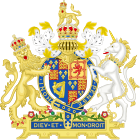Militia Ordinance
 Commencement 15 March 1642 | | |
Status: Not passed | ||
|---|---|---|
The Militia Ordinance was passed by the Parliament of England on 15 March 1642. By claiming the right to appoint military commanders without the king's approval, it was a significant step in events leading to the outbreak of the First English Civil War in August.[1]
The 1641 Irish Rebellion meant there was widespread support in England for raising military forces to suppress it.[2] However, as relations between Charles I and Parliament deteriorated, neither side trusted the other, fearing such an army might be used against them.[3]
The only permanent military force available were the
After failing to arrest the Five Members on 5 January, Charles left London, and headed north to York; over the next few weeks, many Royalist members of the Commons and House of Lords joined him. The result was a Parliamentary majority in the Lords, who approved the bill on 5 March 1642, while confirming doing so was not a violation of the Oath of Allegiance.[4]
The bill was returned to the Commons for approval the same day, then passed to Charles for his royal assent, required for it to become a legally binding Act of Parliament.[3] When he refused, Parliament declared on 15 March 1642 "the People are bound by the Ordinance for the Militia, though it has not received the Royal Assent".[5]
Charles responded to this unprecedented assertion of parliamentary sovereignty by issuing
References
- ^ Hibbert 1993, p. 38.
- ^ Hutton 2003, p. 4.
- ^ a b Firth, Rait 1911, pp. 1–4.
- ^ 5 March 1642: Ordinance of Parliament for the Safety and Defence of the Kingdom & 1767-1830, pp. 624–625.
- ^ 15 March 1642: That the People are bound by the Ordinance for the Militia, though it has not received the Royal Assent & 1767-1830, pp. 645–646.
- ^ Wheeler 1999, p. 148.
Sources
- Firth, C. H.; Rait, R. S., eds. (1911). Acts & Ordinances of the Interregnum 1642-1660; Volume I. HMSO.
- Hibbert, Christopher (1993). Cavaliers and Roundheads: The English at War 1642-1649. ISBN 978-0246136329.
- Hutton, Ronald (2003). The Royalist War Effort 1642-1646. Routledge. ISBN 9780415305402.
- Journal of the House of Lords; Volume 4 5 March 1642. HMSO. 1767–1830.
- Wheeler, J. S. (1999). The Making of a World Power: War and the Military Revolution in Seventeenth Century England. Stroud: Sutton. ISBN 0-7509-2025-4.
External links
- Gardiner, Samuel Rawson, ed. (1906). "50. The Militia Ordinance". The Constitutional Documents of the Puritan Revolution 1625-1660 (3rd Revised ed.). Oxford: Oxford University Press. pp. 245–246 – via Constitution.org.
